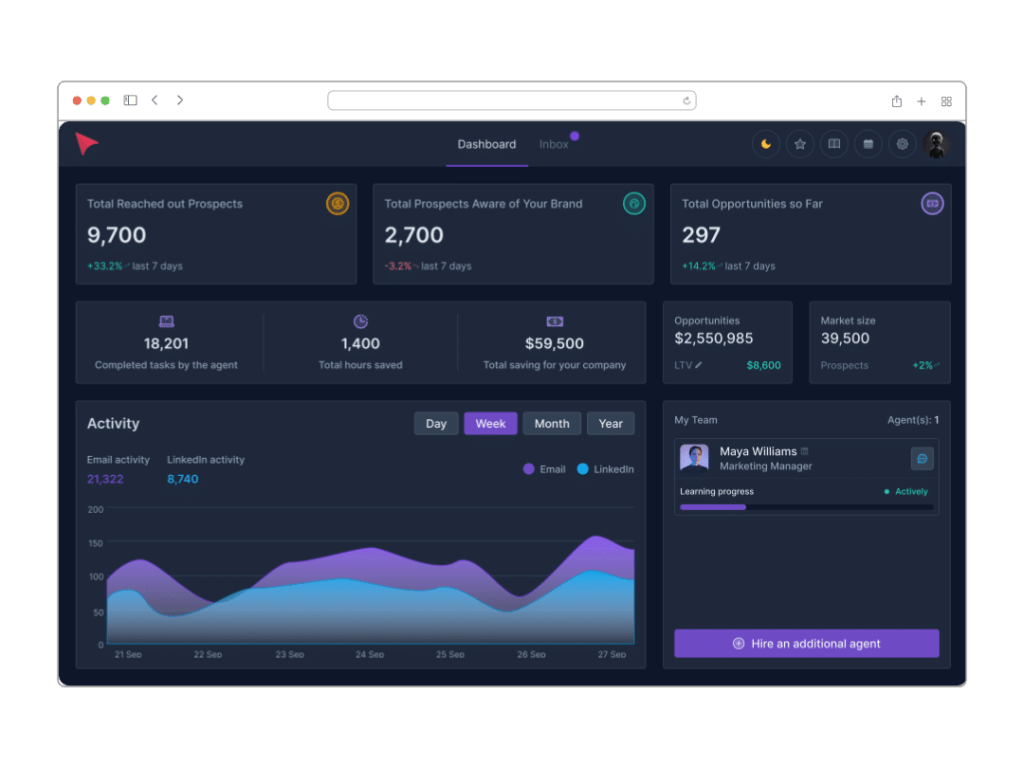AI sales agents are sophisticated software programs that leverage artificial intelligence and machine learning technologies to perform a wide range of sales-related tasks. AI sales assistants may interact intricately, context-awarely with possible clients across several channels unlike basic chatbots or automated email systems. All in real-time, they can grasp normal language, grow from past interactions, and base choices on enormous volumes of data.
These virtual assistants are meant to replicate the finest standards of very successful human salespeople. While always learning and developing their performance, they may qualify leads, nurture prospects, answer product questions, address objections, and even seal transactions.
The multifarious universe of artificial intelligence sales agents will be discussed in this paper together with their advantages, skills, and pragmatic uses. We will also examine actual case studies and offer ideas on how you may apply this revolutionary technology in your own sales systems.
What are AI Sales Agents
Sophisticated software systems meant to automate and improve many facets of the sales process are artificial intelligence sales agents. These virtual assistants qualify leads, engage with possible clients using artificial intelligence, build connections, and occasionally close deals. They can function around-the-clock, analyze data to customize interactions, learn from prior events, and naturally converse across several channels.
Key capabilities of AI sales agents include:
- Natural language conversations with prospects
- Lead qualification and scoring
- Personalized outreach and follow-ups
- Handling common queries and objections
- Data analysis for sales insights
How they differ from traditional sales tools
AI sales agents represent a significant leap forward from traditional sales tools:
1. Autonomy. AI agents can operate independently, making decisions based on real-time data analysis, while traditional tools often require constant human oversight.
2. Adaptability. Unlike static tools with pre-programmed responses, AI agents can adapt their approach based on each unique interaction.
3. Personalization. AI agents offer deep personalization based on comprehensive understanding of prospects, going beyond basic template customization.
4. Learning capability. AI agents continuously improve their performance through machine learning, whereas traditional tools remain static unless manually updated.
5. Task complexity. AI agents can handle a wide range of complex sales activities, from initial outreach to closing deals, while traditional tools are often limited to specific, narrow tasks.
6. Data utilization. AI agents can process and derive insights from both structured and unstructured data, including natural language conversations.
Core technologies behind AI sales agents
1. Natural Language Processing (NLP). Enables understanding, interpretation, and generation of human language, allowing for natural conversations.
2. Machine Learning. Allows agents to learn from data and experiences, continuously improving their performance.
3. Deep Learning. Uses neural networks to process complex patterns in data, useful for tasks like sentiment analysis and behavior prediction.
4. Big Data Analytics. Processes vast amounts of data quickly to derive actionable insights.
5. Cloud Computing. Provides the necessary processing power and scalability for AI operations.
6. APIs and Integration Technologies. Allow AI agents to connect with other systems (CRM, email platforms, etc.) for seamless operation.
7. Voice Recognition and Generation. Enables spoken language understanding and natural-sounding speech responses for voice-based interactions.
These technologies work in concert to create AI sales agents that can perform complex sales tasks with a level of sophistication and effectiveness previously unattainable with traditional sales tools.
The Profitability of AI Sales Agents
AI sales agents have become a revolutionary answer as companies always look for ways to streamline their sales systems and raise their bottom line. Their capacity to improve efficiency, scale operations, and offer data-driven insights qualifies them not only as a technical development but also as a major force behind profitability. Let’s investigate the main elements causing artificial intelligence sales agents to be profitable.
Cost-efficiency Compared to Human Sales Teams
- Reduced Labor Costs
- Lower Training Costs
- Minimized Human Error
- Decreased Overhead
Scalability and 24/7 Availability
- Infinite Scalability
- 24/7 Operation
- Consistent Performance
- Rapid Deployment
Improved Lead Qualification and Conversion Rates
- Accurate Lead Scoring
- Personalized Engagement
- Timely Follow-ups
- Objection Handling
Data-driven Insights for Strategic Decision-making
- Customer Behavior Analysis
- Sales Trend Identification
- Performance Optimization
- Predictive Analytics
- Personalization Insights
Ultimately, AI sales agents’ success results from their capacity to save expenses, scale operations, raise conversion rates, and offer insightful analysis of company matters. Although the initial installation could need investment, the long-term advantages in terms of efficiency, scalability, and data-driven decision-making could greatly increase general profitability.
How AI Can Replace Human Sales Agents
The terrain of customer acquisition and relationship management is changing as artificial intelligence finds its way into sales processes. Examining how AI sales agents might efficiently handle duties often carried out by human sales people is interesting as we assess their capabilities.
👉 AI’s ability in lead creation and qualification is among its most remarkable sales-related strengths. Imagine a relentless digital assistant searching the internet around-the-clock, using sophisticated criteria to find possible consumers that would take human hours to evaluate. By examining corporate data, social media activity, and online behavior, these artificial intelligence agents can identify candidates most likely to convert.
An artificial intelligence sales agent might observe, for example, that a company recently acquired money and is growing its staff – indications that they might be in the market for fresh software solutions. Experienced salespeople used to be the only ones with this degree of thorough, real-time lead qualification; now, artificial intelligence can now do it on mass and with amazing precision.
👉 Although experienced salespeople have always been strong in personalizing, artificial intelligence is increasingly subverting this idea. On a scale not conceivable for human teams, artificial intelligence sales representatives can customize outreach activities. Analyzing enormous volumes of data, from past contacts to public information, artificial intelligence can create communications that appeal to every prospect.
Think about how Netflix utilizes artificial intelligence to customize movie suggestions; now apply that degree of personalizing to sales outreach. An artificial intelligence agent may observe that a prospect regularly interacts with material on sustainability, thus it emphasizes in its communications the environmentally friendly features of a product.
👉 Another area where AI excels is in the unrelenting regularity of follow-up and nurturing. Human sales representatives may neglect to follow up or may approach their work depending on their mood or workload. But artificial intelligence keeps a consistent, ideal tempo of encounters.
Based on prospect behavior, it can send exactly timed follow-up emails, social media messages, or even start direct mail campaigns. Imagine an artificial intelligence that detects a prospect visiting a website three times a week on the pricing page; it might then automatically start a series of nurturing messages or perhaps provide a customized demo.
👉 Regarding managing regular questions and complaints, artificial intelligence is getting more intelligent. Natural language processing lets artificial intelligence bots answer to a broad spectrum of questions and concerns. Although complicated negotiations still gain from a human touch, artificial intelligence can manage an astonishing range of interactions.
Consider how artificial intelligence chatbots have developed from basic FAQ responders to systems able to recognize context and offer complex answers. By addressing typical concerns like cost, feature comparisons, or deployment schedules, an artificial intelligence sales representative could free human agents to concentrate on more difficult areas of the sale.
👉 Data analysis and reporting are maybe among the most potent ways artificial intelligence is substituting for human tasks in sales. While people can see trends and make sense of them, artificial intelligence can examine enormous volumes of data to find trends and prospects that could elude human notice. To find the best tactics, artificial intelligence can examine transaction results, email contacts, and sales conversations.
An artificial intelligence system might find, for instance, that prospects from a given sector respond most to a particular style of communication sent on Tuesday afternoons—a degree of granular knowledge difficult for human analysis to find.
When we consider these skills, it is evident that artificial intelligence is a transforming agent redefining the function of human sales agents rather than only a tool for sales teams. Sales’ future probably rests in a harmonic mix of artificial intelligence efficiency and human emotional intelligence, producing a synergy that raises the whole sales process to unprecedented levels of efficacy and customizing.
Main Performance Statistics and Case Studies
AI sales agents typically boost engagement rates by 50-70% compared to traditional methods. They achieve conversion rates around 10-20%, outperforming human counterparts in consistency and availability.
In the landscape of AI-driven sales, the integration of technologies from companies like Calldrip has showcased significant advancements in sales efficiency and customer engagement. For instance, an auto dealership utilizing AI virtual sales assistants managed to handle after-hours leads with a conversion rate of 33% for booking appointments, demonstrating how AI can extend operational capabilities beyond standard business hours.
Another compelling example comes from BMW, which utilized AI to personalize and enhance customer interactions on social media. This approach led to a 30% increase in engagement, underscoring the effectiveness of AI in boosting customer interaction and brand loyalty.
Furthermore, AI’s ability to streamline operations and enhance decision-making was evident in a case study involving a leading US retailer. With the help of Accenture, the retailer employed AI to optimize media spend, achieving a more efficient allocation of their marketing budget by significantly speeding up data processing and analysis.
These case studies collectively highlight the transformative potential of AI in sales and marketing, from automating customer interactions to optimizing resource allocation and enhancing engagement across various platforms. For businesses considering AI integration, these examples provide a roadmap of the tangible benefits AI can offer, particularly in terms of increased sales, improved efficiency, and stronger customer relationships.
5 Ways Your Company Could Use AI Sales Agents
By including artificial intelligence sales agents into corporate operations, one creates a world of opportunities that transforms established sales procedures and releases new possibilities. Let’s investigate five main domains where these intelligent entities might have a major influence.
Lead generation and qualification
First of all, AI agents excel at lead generation and qualification by sorting enormous volumes of data at amazing rates. By means of sophisticated criteria, internet activity analysis, corporate data, and industry trends, they can ascertain possible consumers. This guarantees that human sales teams concentrate their efforts on the most likely leads, therefore saving time as well.
Personalized email outreach campaigns
Turning now to tailored email campaigns, artificial intelligence offers a degree of customizing never possible at mass. Analyzing a prospect’s interests, behavior, and past encounters helps artificial intelligence create personally relevant communications. The power of artificial intelligence in email outreach is seen in sending hundreds of emails, each feeling as though it were written especially for the recipient.
Social media engagement and prospecting
Another area in which artificial intelligence sales representatives shine is social media prospecting and interaction. By tracking social media channels and using their postings, interactions, and network to find possible leads, they From like pertinent postings to recommending connections, AI can participate in meaningful ways and simultaneously provide insightful analysis for next interactions.
Customer service and support
AI agents are constant, 24-hour assistants in customer service and support. They can answer regular questions, supply product details, and occasionally help with issues. This not only speeds responses but also releases human agents to handle more complicated problems needing a personal approach.
Sales forecasting and pipeline management
Finally, artificial intelligence gives pipeline management and sales forecasting fresh degrees of precision. AI can give more accurate forecasts of future sales by examining historical data, present industry patterns, and continuous transaction activity. This enables companies to decide strategically, with regard to inventory control, and with regard to resource allocation.
It is abundantly evident from considering these uses that artificial intelligence sales representatives are partners in the sales process rather than only tools. They increase human capacity by effectively managing time-consuming chores and offering ideas that guide strategic decisions. Finding the ideal balance and using artificial intelligence’s capabilities to preserve the human aspects of empathy and sophisticated problem-solving that are absolutely vital in sales will help one to succeed.
Potential Issues and Challenges
1. Data privacy and security issues. Ensuring compliance with laws like GDPR and shielding against data breaches is vital as artificial intelligence systems manage private consumer data.
2. Integration with current CRM systems and sales processes. It might be difficult and time-consuming to seamlessly include artificial intelligence agents into present systems.
3. Resistance from sales teams and the necessity for retraining might slow down implementation and lower efficacy in employee acceptance and change management.
4. Maintaining a human touch: Sales contacts provide a difficult task in juggling artificial intelligence efficiency with the demand for human empathy and relationship-building.
5. Ethical issues that companies have to answer are ensuring openness in AI-driven interactions and avoiding manipulative techniques, which begs serious moral concerns.
How You Can Implementing AI Sales Agents

AnyBiz is a comprehensive, AI-driven platform designed to revolutionize the B2B lead generation process. It’s a holistic solution that automates sales and marketing activities, effectively replacing the traditional role of Sales Development Representatives (SDRs) with advanced AI sales agents. AnyBiz combines cutting-edge artificial intelligence and machine learning technologies to deliver a personalized experience for businesses seeking to optimize their lead generation efforts.
Main functions and features of AnyBiz
1. AI Sales Agents. At the core of AnyBiz are AI-driven sales agents that work 24/7. They craft unique, multi-channel outreach sequences for each prospect, making critical decisions on timing, content, and communication channels to maximize engagement.
2. Smart Decision-Making and Personalization. The platform analyzes over 10,000 data points per hour, making billions of decisions automatically. With access to a vast database of over 80 million prospects, AnyBiz ensures every message is personalized across channels like email, LinkedIn, and Twitter.
3. Automated Email Management. The system classifies client emails into over seven categories and can respond automatically. It also includes email domain warming and open rate analysis to improve deliverability and engagement.
4. Multi-Channel Engagement and Brand Awareness. AnyBiz actively engages on platforms like LinkedIn, writing posts and interacting with content to increase brand visibility. It also creates personalized landing pages for each prospect.
5. Integration and Analytics. The platform integrates with existing CRM systems like HubSpot and offers a comprehensive dashboard to track metrics such as brand awareness, opportunities created, and time saved compared to hiring employees.
Step-by-step guide to implementing AnyBiz
1. Connect LinkedIn:
– Link your LinkedIn account
– AnyBiz automatically detects your website (you can change it or indicate if you don’t have one)
2. Confirm Your Position:
– Your job position is automatically generated
– You can modify it if needed
3. Review Business Description:
– AnyBiz automatically generates descriptions of your offer, product, business offers, and problems your business solves
– Review and adjust these as necessary
4. Choose Potential Customer:
– Select from a provided list of potential current customers
5. Define Target Prospect:
– Choose the job title of your ideal target prospect
6. Add Calendly Link (Optional):
– If you use Calendly, add your link for easy meeting scheduling
After completing these steps, AnyBiz takes care of the technical setup:
– Domain Purchase – AnyBiz buys a domain for your outreach campaigns
– Email Setup – mailboxes are created and set up for you
– Email Warming – your new email domain is warmed up to improve deliverability
Once the setup is complete, your AI sales agents start working to find potential customers for your business. This streamlined process allows businesses to quickly leverage AnyBiz’s AI-driven lead generation capabilities, potentially improving ROI, enhancing lead quality, and accelerating business growth.
Experience the power of AI-driven sales agents with AnyBiz’s 7-day free trial.
No credit card required. Full access to all features. Transform your sales process today!
Conclusion
AI sales agents are transforming company approaches to lead generation, customer interaction, and sales processes. Companies can greatly increase their efficiency and effectiveness in the competitive market by using these sophisticated solutions for lead qualifying, tailored outreach, social media interaction, customer support, and sales forecasting.
Although there are obstacles, especially in data privacy and keeping a human touch, artificial intelligence clearly helps sales. Those who accept and properly apply artificial intelligence sales agents will probably find themselves rather competitive as technology develops.
The harmonic mix of artificial intelligence efficiency and human knowledge will define sales going forward. Businesses can not only simplify their operations but also give their consumers more tailored, responsive, and valued experiences by knowing and using the potential of artificial intelligence sales representatives.
📜 Related articles:


